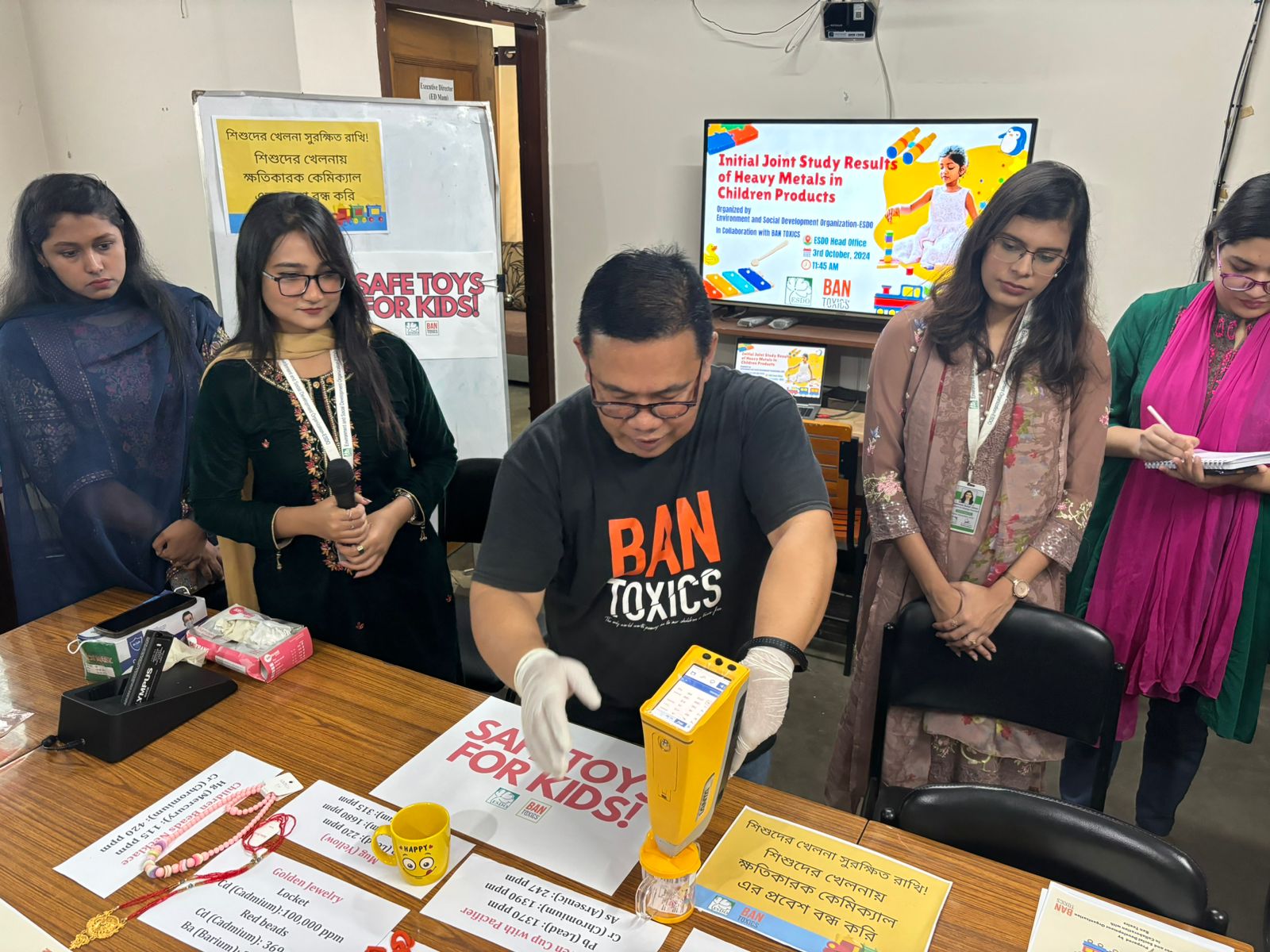
Published :
Updated :

A new study on Thursday revealed that toys and products for kids contain toxic substances made from recycled plastic.
According to XRF analysis, all 160 samples tested contained one or more hazardous chemicals, including mercury, lead, bromine, cadmium, arsenic, and other harmful substances like heavy metals and persistent organic pollutants (POPs).
The research team of the Environment and Social Development Organization- ESDO and BAN Toxics, Philippines disclosed the findings at a press briefing held at ESDO's head office in Dhaka.
The key findings of the study said that —a children's water cup, an everyday essential, contained 1,380 ppm of lead, 247 ppm of arsenic, and 1,390 ppm of chromium—a toxic in a simple drinking cup.
A stationary bag, commonly used by children, revealed 580 ppm of lead, a staggering 1,280 ppm of barium, and 88 ppm of mercury—making a child's school supplies a hidden health hazard.
A kid's doll set tested with 160 ppm of lead and a shocking 1,500 ppm of chromium—turning a beloved toy into a dangerous object. A children's mug, another everyday item, contained 220 ppm of lead, 315 ppm of cadmium, and 1,680 ppm of chromium—exposing children to a potential health risk with every sip.
Even from a renowned toy shop, a doll set had around 500 ppm of lead, proving that not even high-end stores are free from harmful chemicals.
A colorful letter from an alphabet set showed 660 ppm of lead—a startling finding in a product designed to help children learn.
Syed Marghub Murshed, Former Secretary and Chairperson of ESDO, highlighted the gravity of the situation: “The presence of such hazardous chemicals in children's products is an urgent public health issue. We must act swiftly to protect our future generation from these invisible threats.”
Shahriar Hossain, Secretary General of ESDO, called for strict legislation to control the use of recycled plastics in toys: “The use of recycled plastic in children’s toys is alarming because it introduces harmful chemicals like heavy metals into products that children are exposed to every day.
These materials should not be repurposed into items meant for kids. We need urgent action to ban the use of recycled plastics in toys and ensure that children’s products are free from toxic substances. The safety and well-being of our children must come before everything else,” he added.
Siddika Sultana, Executive Director of ESDO, stressed the long-term impacts on children’s health: “Exposure to toxic chemicals at such an early age leads to developmental, cognitive, and physical issues that can last a lifetime. This is a crisis that demands immediate regulatory intervention.”
Jashaf Shamir Lorenzo, Deputy Executive Director of BAN Toxics, and Thony Dizon, Toxics Campaigner of BAN Toxics issued a joint statement: “The initial results of our joint study highlight a troubling reality - our children are exposed daily to various toxic chemicals that can impact their development and long-term health.
The same toys we found in our local markets in Bangladesh are also sold openly in other Asian countries like the Philippines, shedding light on the transboundary nature of the problem and the need for regional and global approaches towards ensuring that unsafe products are removed from our markets."
Concerned agencies should make sure that adequate product standards are in place, and that the enforcement of such policies becomes a priority so that our children enjoy a toxics-free future, their statement read.
ESDO and BAN Toxics urged authorities to take immediate action to remove these dangerous products from store shelves and strengthen safety standards to prevent further exposure to hazardous chemicals.
The theme presentation was presented by ESDO’s Program Associate Shanon Iffat Alam.


 For all latest news, follow The Financial Express Google News channel.
For all latest news, follow The Financial Express Google News channel.